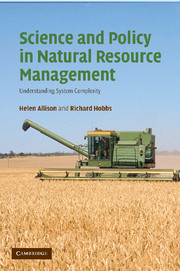Book contents
- Frontmatter
- Contents
- List of illustrations
- List of tables
- Foreword
- Preface
- Acknowledgements
- List of abbreviations
- 1 Introduction
- 2 Historical and policy context
- 3 Natural resource degradation: a resistant problem of the twentieth century
- 4 The epistemology of natural resource management of the twentieth century
- 5 A contemporary epistemology and framework for natural resource management of the twenty-first century
- 6 Model conceptualisation of the Western Australian agricultural region. Part 1: resilience analysis
- 7 Model conceptualisation of the Western Australian agricultural region. Part 2: system dynamics
- 8 Synthesis
- Epilogue
- Glossary
- References
- Index
5 - A contemporary epistemology and framework for natural resource management of the twenty-first century
Published online by Cambridge University Press: 01 March 2010
- Frontmatter
- Contents
- List of illustrations
- List of tables
- Foreword
- Preface
- Acknowledgements
- List of abbreviations
- 1 Introduction
- 2 Historical and policy context
- 3 Natural resource degradation: a resistant problem of the twentieth century
- 4 The epistemology of natural resource management of the twentieth century
- 5 A contemporary epistemology and framework for natural resource management of the twenty-first century
- 6 Model conceptualisation of the Western Australian agricultural region. Part 1: resilience analysis
- 7 Model conceptualisation of the Western Australian agricultural region. Part 2: system dynamics
- 8 Synthesis
- Epilogue
- Glossary
- References
- Index
Summary
Separations of disciplines and politics are artefacts of the human mind, not characteristics of the real world.
Donella Meadows and Jennifer Robinson, 1985Introduction
In Chapter 4, we examined the epistemology of natural resource management of the twentieth century and we made the case that natural resource management was based on the normal science paradigm and that there was a need to change towards a pluralistic and holistic approach. At the time when many natural resource policies were established, issues were considered to be largely local, reversible and direct, whereas today impacts are changing rapidly, are considered to be irreversible, and geographically and economically interactions occur at a global scale (Daily, 2000; Lambin et al., 2001). Conceptual development has not kept pace with the speed of changes that alter and control the processes in large-scale systems (Gunderson and Pritchard, 2002). Poor conceptual development of these systems has hindered our understanding of their dynamic behaviour and weakened our ability to respond to increasingly uncertain behaviour, with neither appropriate policy nor management.
The way we perceive problems and how we go about problem solving and decision making depends on human interpretation of information (Meadows and Robinson, 1985). Information from the past and present is required to make decisions and to take action, and that requires knowledge of the future and the consequences of those decisions. Models, that is, any set of generalisations or assumptions about reality, are the means that humans use to help in problem solving, prediction and decision making.
- Type
- Chapter
- Information
- Science and Policy in Natural Resource ManagementUnderstanding System Complexity, pp. 83 - 120Publisher: Cambridge University PressPrint publication year: 2006



